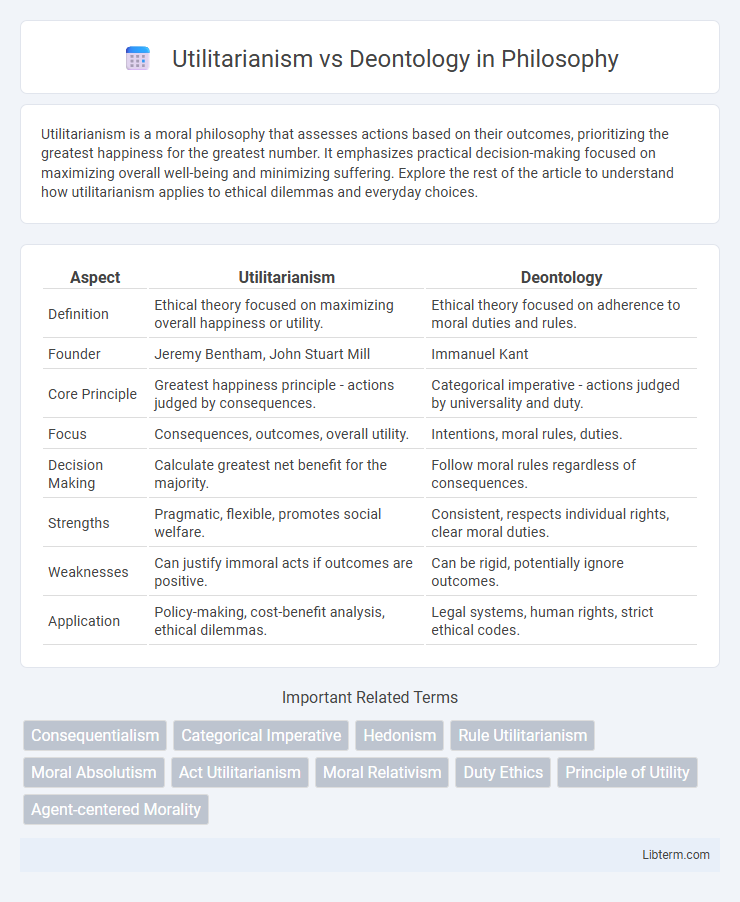Utilitarianism is a moral philosophy that assesses actions based on their outcomes, prioritizing the greatest happiness for the greatest number. It emphasizes practical decision-making focused on maximizing overall well-being and minimizing suffering. Explore the rest of the article to understand how utilitarianism applies to ethical dilemmas and everyday choices.
Table of Comparison
| Aspect | Utilitarianism | Deontology |
|---|---|---|
| Definition | Ethical theory focused on maximizing overall happiness or utility. | Ethical theory focused on adherence to moral duties and rules. |
| Founder | Jeremy Bentham, John Stuart Mill | Immanuel Kant |
| Core Principle | Greatest happiness principle - actions judged by consequences. | Categorical imperative - actions judged by universality and duty. |
| Focus | Consequences, outcomes, overall utility. | Intentions, moral rules, duties. |
| Decision Making | Calculate greatest net benefit for the majority. | Follow moral rules regardless of consequences. |
| Strengths | Pragmatic, flexible, promotes social welfare. | Consistent, respects individual rights, clear moral duties. |
| Weaknesses | Can justify immoral acts if outcomes are positive. | Can be rigid, potentially ignore outcomes. |
| Application | Policy-making, cost-benefit analysis, ethical dilemmas. | Legal systems, human rights, strict ethical codes. |
Introduction to Utilitarianism and Deontology
Utilitarianism, founded by Jeremy Bentham and further developed by John Stuart Mill, emphasizes maximizing overall happiness and minimizing suffering as the basis for moral decision-making. Deontology, primarily associated with Immanuel Kant, focuses on adherence to moral duties and rules regardless of the consequences. Both ethical theories offer distinct frameworks: utilitarianism evaluates actions by their outcomes, while deontology judges actions based on their intrinsic rightness or wrongness.
Historical Background of Both Ethical Theories
Utilitarianism, rooted in the works of Jeremy Bentham and John Stuart Mill in the 18th and 19th centuries, emphasizes the greatest happiness principle, measuring ethical decisions by their outcomes and overall utility. Deontology, formulated primarily by Immanuel Kant in the 18th century, focuses on duty, moral rules, and the inherent rightness of actions regardless of consequences. Both theories emerged as critical responses to Enlightenment ideas, shaping modern moral philosophy by contrasting consequence-based ethics with rule-based frameworks.
Core Principles of Utilitarianism
Utilitarianism centers on the principle of maximizing overall happiness or utility, advocating actions that result in the greatest good for the greatest number. It evaluates moral choices based on their consequences and the balance of pleasure over pain. This consequentialist framework contrasts with deontology, which emphasizes duties and rules irrespective of outcomes.
Key Tenets of Deontological Ethics
Deontological ethics emphasizes the inherent morality of actions based on rules and duties rather than consequences, asserting that certain acts are intrinsically right or wrong. Key tenets include adherence to universal moral laws, respect for individuals as ends in themselves, and the principle of duty-driven decision-making regardless of outcomes. This framework contrasts with utilitarianism by prioritizing moral obligations over the maximization of overall happiness or utility.
Major Philosophers: Bentham, Mill, Kant
Utilitarianism, championed by Jeremy Bentham and John Stuart Mill, emphasizes maximizing overall happiness and minimizing pain as the measure of moral rightness. Bentham introduced the principle of utility, focusing on quantifiable pleasure, while Mill refined utilitarianism by considering qualitative differences in happiness. Immanuel Kant, the foremost deontologist, argued that morality is grounded in duty and adherence to universal moral laws, prioritizing intention and the categorical imperative over consequences.
Decision-Making Processes Compared
Utilitarianism evaluates decisions by calculating the greatest overall happiness or utility resulting from an action, emphasizing outcome-based analysis. Deontology, conversely, relies on adherence to moral rules or duties, prioritizing the inherent rightness or wrongness of actions irrespective of consequences. Decision-making in utilitarianism involves cost-benefit assessments, while deontology focuses on obligation fulfillment and ethical principles.
Case Studies: Utilitarian vs Deontological Solutions
Case studies comparing utilitarian and deontological solutions highlight distinct ethical decision-making frameworks: utilitarianism prioritizes outcomes by maximizing overall happiness or utility, while deontology emphasizes adherence to moral duties and rules regardless of consequences. For instance, in medical ethics dilemmas like triage during pandemics, utilitarian approaches prioritize saving the greatest number of lives, whereas deontological ethics insists on equal respect for all individuals, rejecting sacrifice of some for the benefit of others. These contrasting approaches underscore how ethical theories influence policy-making and individual judgments in real-world scenarios.
Strengths and Weaknesses of Utilitarianism
Utilitarianism's strength lies in its clear, outcome-oriented approach, emphasizing the greatest happiness for the greatest number, which simplifies ethical decision-making by quantifying consequences. However, its weaknesses include the potential justification of morally questionable actions if they result in overall happiness, and the difficulty of accurately predicting and measuring all outcomes. This framework may also inadequately protect individual rights, as it prioritizes collective welfare over personal justice.
Strengths and Weaknesses of Deontology
Deontology emphasizes adherence to moral rules and duties, providing clear ethical guidelines that promote consistency and respect for individual rights. Its strength lies in offering an objective framework that does not rely on consequences, ensuring moral actions uphold justice and fairness. However, deontology's rigidity can lead to conflicts between duties and difficulties in handling complex situations where rules may clash or produce unintended negative outcomes.
Implications for Modern Ethical Dilemmas
Utilitarianism, emphasizing the greatest good for the greatest number, often leads to decisions prioritizing overall happiness even if it compromises individual rights, impacting debates on issues like public health policies and AI ethics. Deontology, grounded in duty and adherence to moral rules, insists on respecting individual rights and intentions regardless of outcomes, influencing perspectives on privacy, consent, and justice. These contrasting ethical frameworks shape contemporary discussions on balancing collective benefits with personal autonomy in complex scenarios like vaccine mandates and data privacy.
Utilitarianism Infographic

 libterm.com
libterm.com